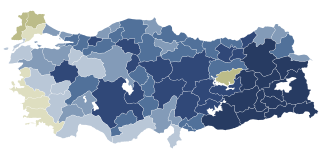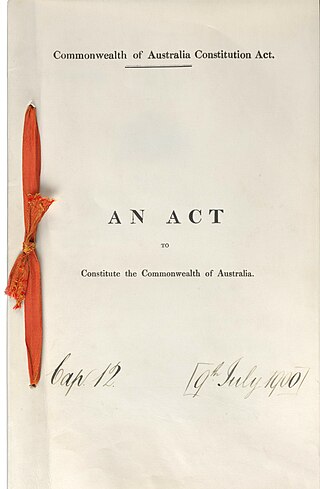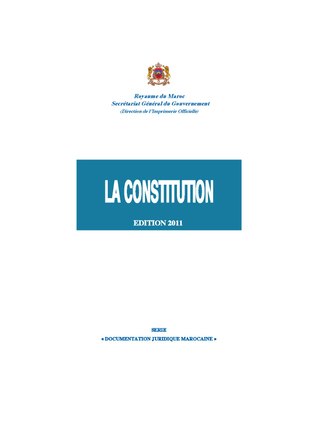
A popular initiative is a form of direct democracy by which a petition meeting certain hurdles can force a legal procedure on a proposition.
A constitutional amendment is a modification of the constitution of a polity, organization or other type of entity. Amendments are often interwoven into the relevant sections of an existing constitution, directly altering the text. Conversely, they can be appended to the constitution as supplemental additions, thus changing the frame of government without altering the existing text of the document.
A supermajority is a requirement for a proposal to gain a specified level of support which is greater than the threshold of one-half used for a simple majority. Supermajority rules in a democracy can help to prevent a majority from eroding fundamental rights of a minority, but can also hamper efforts to respond to problems and encourage corrupt compromises at times when action is taken. Changes to constitutions, especially those with entrenched clauses, commonly require supermajority support in a legislature. Parliamentary procedure requires that any action of a deliberative assembly that may alter the rights of a minority have a supermajority requirement, such as a two-thirds vote. In consensus democracy the supermajority rule is applied in most cases.
A double majority is a voting system which requires a majority of votes according to two separate criteria. The mechanism is usually used to require strong support for any measure considered to be of great importance. Typically in legislative bodies, a double majority requirement exists in the form of a quorum being necessary for legislation to be passed.

The Constitution of Ukraine is the fundamental law of Ukraine. The constitution was adopted and ratified at the 5th session of the Verkhovna Rada, the parliament of Ukraine, on 28 June 1996. The constitution was passed with 315 ayes out of 450 votes possible. All other laws and other normative legal acts of Ukraine must conform to the constitution. The right to amend the constitution through a special legislative procedure is vested exclusively in the parliament. The only body that may interpret the constitution and determine whether legislation conforms to it is the Constitutional Court of Ukraine. Since 1996, the public holiday Constitution Day is celebrated on 28 June.
In Australia, referendums are public votes held on important issues where the electorate may approve or reject a certain proposal. In contemporary usage, polls conducted on non-constitutional issues are known as plebiscites, with the term referendum being reserved solely for votes on constitutional changes, which is legally required to make a change to the Constitution of Australia.

The Australian republic referendum held on 6 November 1999 was a two-question referendum to amend the Constitution of Australia. The first question asked whether Australia should become a republic, under a bi-partisan appointment model where the president would be appointed by the federal parliament with a two-thirds majority. This was the model that was endorsed by the Constitutional Convention, held in Canberra in February 1998. The second question, generally deemed to be far less important politically, asked whether Australia should alter the Constitution to insert a preamble.

A constitutional referendum on electoral reform was held in Turkey on 21 October 2007. After the aborted attempt to elect the next president in May 2007, the government of Recep Tayyip Erdoğan introduced substantial electoral reforms in parliament which were then passed with the votes of Erdoğan's Justice and Development Party and the opposition Motherland Party.

A popular referendum, depending on jurisdiction also known as a citizens' veto, people's veto, veto referendum, citizen referendum, abrogative referendum, rejective referendum, suspensive referendum, and statute referendum, is a type of a referendum that provides a means by which a petition signed by a certain minimum number of registered voters can force a public vote (plebiscite) on an existing statute, constitutional amendment, charter amendment, or ordinance; in its minimal form, it simply obliges the executive or legislative bodies to consider the subject by submitting it to the order of the day. It is a form of direct democracy.
Referendums in Taiwan at both the national and local level are governed by the Referendum Act of Taiwan, which was enacted by the Legislative Yuan in December 2003. Citizens can propose laws via referendums at the national and local levels. The Referendum Act also allowed people to make changes or abolish laws by referendums.

The Constitution of Australia is the fundamental law that governs the political structure of Australia. It is a written constitution, which establishes the country as a federation under a constitutional monarchy governed with a parliamentary system. Its eight chapters set down the structure and powers of the three constituent parts of the federal level of government: the Parliament, the Executive Government and the Judicature.

A constitutional referendum to amend the constitution of Latvia in order to allow one-tenth of the total registered electorate to initiate a popular referendum to dissolve the Latvian parliament was held in Latvia on 2 August 2008.

A nationwide referendum was held in Moldova on 5 September 2010 on whether or not the country should amend the Constitution of Moldova to return to direct popular election of the president. Since 2001, the president had been indirectly elected by Parliament, with a supermajority of 61 seats required for election. The voters are asked to answer the following question: "Would you agree with the Constitutional amendment, which would allow the election of the President of the Republic of Moldova by the entire population?" Voters chose one of the proposed options: "Yes (for)" or "No (against)". Of those who had cast their vote, 87.83% chose "Yes". However, the referendum did not pass because only 30.29% of voters turned out, short of the necessary 33% for the referendum to be considered valid.

A constitutional referendum on a number of changes to the constitution was held in Turkey on 12 September 2010. The results showed the majority supported the constitutional amendments, with 58% in favour and 42% against. The changes were aimed at bringing the constitution into compliance with European Union standards. Supporters of Turkish EU membership hope constitutional reform will facilitate the membership process.

Early parliamentary elections were held in Nauru on 19 June 2010 after the previous parliamentary election in April 2010 had resulted in a deadlock between government and opposition, tied at nine seats each. This led to an extended state of emergency in Nauru as a result of this election.

A constitutional referendum was held in Egypt on 19 March 2011, following the 2011 Egyptian revolution. More than 14 million (77%) were in favour, while around 4 million (23%) opposed the changes; 41% of 45 million eligible voters turned out to vote.

The Constitution of Morocco is the supreme law of the Kingdom of Morocco. The constitution defines Morocco as a constitutional monarchy and lays out the fundamental rights of Moroccan citizens, it also defines the basis and structures of government, the council of ministers, and the parliament.
A referendum is a direct vote in which an entire electorate is asked to either accept or reject a particular proposal. This article summarises referendum laws and practice in various countries.
Constitutional recognition of Indigenous Australians refers to various proposals for changes to the Australian Constitution to recognise Indigenous Australians in the document. Various proposals have been suggested to symbolically recognise the special place Indigenous Australians have as the first peoples of Australia, along with substantial changes, such as prohibitions on racial discrimination, the protection of languages and the addition of new institutions. In 2017, the Uluru Statement from the Heart was released by Indigenous leaders, which called for the establishment of an Indigenous Voice to Parliament as their preferred form of recognition. When submitted to a national referendum in 2023 by the Albanese government, the proposal was heavily defeated.
The Twenty-first Amendment (21A) to the Constitution of Sri Lanka was passed by the 225-member Sri Lankan Parliament with 179 voting in favor, 1 against and 45 abstained on 21 October 2022. The bill was passed with a two-third majority and it was reported that only one MP, Sarath Weerasekara, voted against the bill while 45 MPs were notably absent when the bill was passed in the parliament. The 21st Amendment was originally known as the 22nd Amendment in the political discourse and according to Newsfirst the said amendment would be added to Sri Lankan legislation as the 21st Amendment. The draft amendment was formulated during the critical juncture in Sri Lanka at a time when the country was reeling from massive economic crisis, political chaos and massive anti-government crackdowns. Major changes were made to the text of the draft of the 22nd amendment following the ousting of Gotabaya Rajapaksa. The draft was initially presented to the parliament by Minister of Justice, Prison Affairs and Constitutional Reforms Wijeyadasa Rajapakshe. in August 2022 and the cabinet granted approval for the draft. The 22nd Amendment was initially tabled in the Cabinet on 6 June 2022 by Wijeyadasa Rajapakshe and the discussion on it had been adjourned on multiple occasions due to the failure to reach a consensus after series of disagreements.













